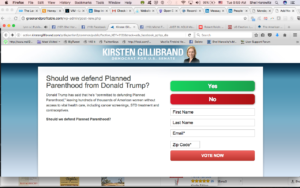Why I Found this Democratic US Senator’s Survey Unethical
Dear Senator Gillibrand,
I have been a fan of your since you took office. However, after following your Facebook link to the Planned Parenthood funding survey, I have to say I felt tricked, deceived, and betrayed.
I’ve used this blog to call out unethical marketing from various companies over the years. And even though you and I share many political views (including a strong commitment to women’s rights)—I have to call you out on this.

I had no problem with the initial one-question survey. But then I opted in to the follow-up questions.
First, as a survey instrument, the questions were useless. Each had only a yes or no option, written in language that showed a clear bias toward one answer. Yes, you’ll be able to prepare a press release that could cite a number like 95 percent of respondents—but it’s meaningless. You’d be laughed off the page, or worse, publicly shamed, by journalists who bother to look at the source data.
Second, after I checked off my answers and tried to submit, my phone took me to a page demanding money. I say demanding rather than asking, because there was no way out except by giving money. My submit button was refused when I left the field blank and refused again when I put in a zero. And when I exited the page without contributing, it tried to post to my Facebook page that I had just contributed to you. I have no way of knowing if my responses were actually counted—but I can tell you I did not appreciate being trapped and manipulated like this.
I don’t have a problem being asked for money at the end of a survey, when it’s my choice whether to give or not. But this felt like a shakedown, quite frankly. It left a very bad taste.
I would find this unacceptable from any politician and any charity. But since you were “the very first member of Congress to put her official daily schedule, personal financial disclosure and federal earmark requests online” and cited by The New York Times for your commitment to transparency, I find this an especially bitter pill.
As a marketer, I am saddened to see you resorting to Trumpian tactics based in dishonesty and lack of transparency. You’re better than this. In Michelle Obama’s famous line, “When they go low, we go high.”
Sincerely,
Shel Horowitz, marketing strategist and copywriter
